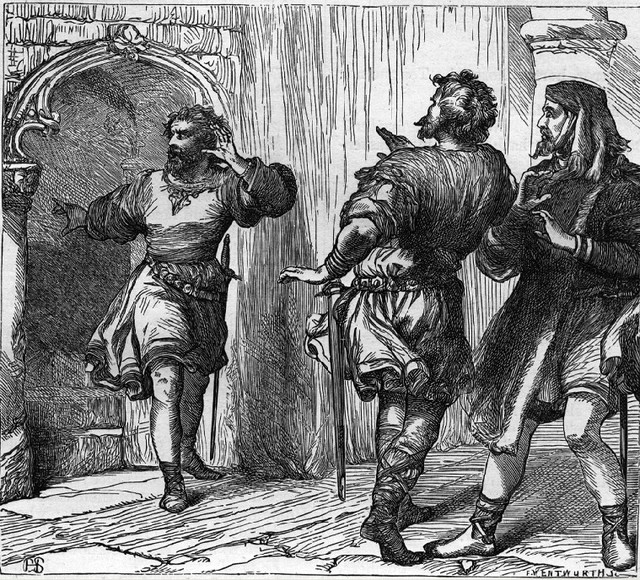
(Question taken from the Indispensable Work-Book on Shakespeare's Macbeth by Usha Nagpal published by National Publishing House. Suitable for class XI. Only Essay type questions answered here. If you have a doubt post a comment below. Leave your mail id if you need a personal response - else i will post my reply to this blog.)
Q1. Give a vivid account of the porter scene.The scene starts with the porter. The porter is very drunk after he has been "carousing" at the feast. Although the Porter is rather drunk, the jokes that he makes about keeping Hell's Gate become reality when Macduff discovers the terrible scene in the King's bedroom. He describes himself as the "devil-porter" letting people into "hell". He is really Macbeth's porter letting people into Macbeth's castle and he is calling the castle a type of hell on Earth. The porter describes the types of people who come to hell. He tells us of the farmer who committed because he did not get the profit that he was expecting. He talks of the equivocator who could argue convincingly on both sides but could not convince God to let him into heaven. Then he talks of the tailor who came into hell as he had stolen some cloth. The porter describes various types of people to show that all types of people who commit sin come to hell. He says that hell is very hot - i.e. they would suffer in hell for their mis-deeds. The porter says that so many people come to hell the a gate-keeper would grow old just opening and closing the gates of hell.
This is a good example of dramatic irony as the reader knows what has been going on in the previous scene. Shakespeare uses a lot of dramatic irony in this particular scene. Shakespeare uses sentences such as, "Here's a knocking indeed", "If a man were porter of hell-gate" and "turning the key. Shakespeare uses words related to hell to give the scene a lot more effect. He uses words such as "equivocator", nouns such as "Beelzebub" and phrases such as "have napkins enow about you, here you'll sweat".
Q2. List the dramatic functions of the porter scene.
The porter scene follows Duncan's heinous murder evokes some laughter and brings an element of relief in the play. Although the gatekeeper character brings in some comedy, it also has a deeper significance. This "thoughtful laughter" primarily provides comic relief, but it also contributes to the meaning of the work by comparing the castle of Duncan to the gate of hell.
Macbeth's porter scene functions above all as slapstick comic relief following the slaughter of King Duncan. The gatekeeper reduces the tension built in the previous scenes with his drunken talk. For example, he paints a darkly comic caricature of the suspense that now pervades the Macbeth household by making light of the sudden knocking at the gates that so startled Lady Macbeth. Yet this also serves as a paradox - the parody also furthers the tension by prolonging the time between Duncan's murder and the continuation of the plot. This scene immediately prompts laughter with both the porter's light soliloquy and the heightening of the suspense.
However, the character's drunken talk also gives rise to one of the second act's central theme - the house of Macbeth as the gates of hell. His speech refers to satanic images, and he views himself as Beelzebub's gatekeeper. In this act, Shakespeare sees Macbeth's as the central character of death and corruption, evidenced by the evil plans of its Lady and the bloodthirsty acts of its Master. The porter scene emphasizes the fact that all who enter the castle and stand in the way of Macbeth's ambition might as well have entered hell, as they will certainly find a fiery death within. While this scene elicits laughter, it also contributes to Shakespeare's condemnation of Macbeth's escapades.
Macbeth's porter scene also furthers the drama's structure. The previous deeds in Act II have all transpired in an evil supernatural settings - these shocking murders could not have occurred with Shakespeare's settings. The porter scene, by evoking laughter, serves as a movement from the supernatural world of murder to the more real world.
Shakespeare's porter scene causes "thoughtful laughter" and reduces the high tension.
Q3. Bring out the humour and irony of the Porter scene.
There is humour as well as irony in the porter scene. The irony is that the porter compares his letting in people into the castle as letting people into hell. He compares himself to the gate-keeper of hell. Little does the porter know that the events which had taken place (which he does not know of yet - the murder of king Duncan) makes his comparison very real. The murder of Duncan and his guards had indeed made Macbeth's castle a hell.
The humor comes from soliloquy of the porter. He says "who's there in the name of Beelzebub"?. He compares himself to be the gate-keeper of the devil. He then brings humour by describing the reasons why people come to hell. The farmer came to hell because he killed himself for not making the expected profit from his harvest. The equivocator, who could argue on either sides, came to hell because he betrayed his country. The tailor came to hell because he had stolen some cloth. This shows that all kinds of people go to hell - for offences big and small. He also bring humour by saying " having napkins enow about you, here you will sweat". Thus the dialogues and the descriptions both bring in humor.
No comments:
Post a Comment